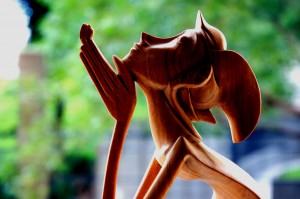;
;
;
;
;
;
;
What a treat! Mel spilled over to Sunday this week to bless us with a guest post. Enjoy…
I was once asked to teach the Gospel Doctrine class, and I seriously wondered if maybe I would be teaching the “class in the hall,” because that’s where I could traditionally be found. Sitting quiet has always been difficult for me in even the best meetings, and I’ve long believed those minutes between meetings to be sacred space. But I’ve felt pretty alone in these opinions, second guessing myself for not being more “worshipful”.
A recent visit to my local Unitarian Universalist congregation made me rethink what a worship experience actually means.
We began the service with a Hindu story about a Svetaketu, a college boy returning home from his studies. Believing that with all the knowledge his son has accessed he still did not know the really important things of life, Svetaketu’s father pours salt into water and asks his son to separate them. Of course it is impossible, so the father says “although your eyes do not help you see God, yet there are other ways you may use to find out whether or not God is. God, like the salt, is everywhere-here, there, and far off. As the salt is hidden in the water, so is God hidden in all the world. God is spirit, as you yourself are spirit. God is hidden in you, my son. God is you, and you are part of God.”
The minister went on to describe two strikingly different pathways to God within Hinduism. In the Philosophical Hindu practice, knowledge of God is sought through renunciation from the world — removing oneself from pleasure, power, wealth, relationships, etc. There is no personal God with whom a relationship can be sought because God is beyond knowing, like salt in water.
In contrast, Devotional Hinduism centers on a relationship with God. We heard the poetry of Mirabai where she describes a very personal relationship with a God she loves dearly:
I can’t forget about love
for more than two seconds.
I get dizzy if I think about anything
but the way you pant
in my ear.
For devotionalists, wise spiritual beings offer guidance and help to make way through the world.
;
The sermon went on to identify that these are two approaches within the same religion, and there are several ways to connect with the sacred. Some prefer quiet introspection while others find the divine through a personal relationship. At the time, their congregation was determining whether they would clap during services. Some thought it distracted from the focus of the meeting while others enjoyed the energy and warmth it added. Both, said the minister, were “right” and worthy of respect.
;
We don’t clap during worship in the LDS faith, but is that because it’s displeasing to God or just not our style? We have quiet and somber worship services like those in the temple and we have lively ward socials. I’m even beginning to think my class in the hall has a place in certain worship styles. If there’s room in Hinduism for several approaches, there must be room in our big tent of Mormonism.
;
How do you connect with the sacred?
;
;
;


Just because we’re sitting quietly doesn’t mean we’re worshipping. It would be nice if the various religions could allow for diversity of approach among worshippers, but I suspect it’s unlikely. The next best thing is to shop around for a comfortable fit–not an easy task for people who believe their church offers the only path to God.
There have been many times when I wished I could clap. And many times when I have been quiet and was not feeling worshipful and was definitely not connecting to the divine.
This reminds me of a recent Primary (non-Mormons: this is basically what we call Sunday School for kids ages 3-12) lesson about keeping the Sabbath Day holy. We talked about what kinds of things were “appropriate” and what kinds of things were not appropriate to do on Sunday. As the lesson drew to a close, one of the kids raised his hand and said, “So basically, if it’s fun, we can’t do it.” I thought that was a sad conclusion to come to, but definitely a reasonable one for a kid to arrive at after listening to the lesson.
Why do we associate quietness/reverence with worship? It’s an interesting question.
@Heather and Course Correction: What I loved about this minister was how he wanted to accommodate both types of worship experiences, everyone needed to give a little. He ended his talk with the quote “Bow down and worship where others kneel”
I think being quiet and introspective can be meaningful to many types of people, and it has its place within my own spiritual practice. I went to a place in New Zealand almost untouched by human influence and we had a moment of silence so we could experience real silence and it was extremely moving. But I don’t know why we LIMIT our sense of God to quiet activities. Do we believe God wouldn’t clap after we poured our heart into a musical performance? Do we think God can’t appreciate a good laugh or a dynamic conversation? I attended a baptism once where the woman literally screamed with excitement as she came out of the water and except for all the people in the audience who were uncomfortable, I found the moment magical.
In the south. . . it’s traditional to say AMEN, when the speaker says something you agree with, or PRAISE JESUS. So the Mormon services in North Carolina while on my mission were spotted with people who did this. No one would have thought to ask them to be quiet. It was how it was.
Also on testimony day – it was a RACE to the pulpit so you could praise the Lord. Sometimes it was 2 hours of testimonies on those Sundays with the audience AMENing and PRAISing with the speaker.
I’ve thought of this often because there was something very real about how these people did church and worshipped. But it definitely wasn’t textbook Mormonism. It’s probably very telling that the Mormonism that I have always loved are the branches that have not yet conformed to the basic, quiet, self-promoting religion that I have found closer to Utah.
I trust in God. His hand is on all of us and He will guide us to Him in His own time and way.
Angie, I have had similarly positive experiences working in Spanish-speaking branches in Texas and Louisiana for about 10 years. Lots more focus on serving, the basics–and lots less worrying about things that aren’t doctrine at all, but that seem to be a primary focus in other more mainstream wards.
I’ve not been in a branch/ward where anyone said “praise” or “Amen” at any point. I think I’d like that, though.
Angie–where in North Carolina did you serve?
Great post! Sadly, I think that in Mormonism we are missing EXUBERANCE. Where is our sacred clapping and liturgical dance? I hope that the “global Church” will shift from merely exporting American culture to fostering a new culture with the best of the many. Let’s get some African drums in our stuffy chapels. :)
Ugh, yes! Sacrament meeting the last couple weeks has just been painfully boring–I mean, unusually so. I feel diminished afterwards rather than uplifted. Exuberance? Forget about it.
When I was growing up, the ward chorister used to sometimes stop us midstream–just cut off the whole congregation–and tell us that just wasn’t good enough and would say we were going to start over. I wish we’d do some more of that.